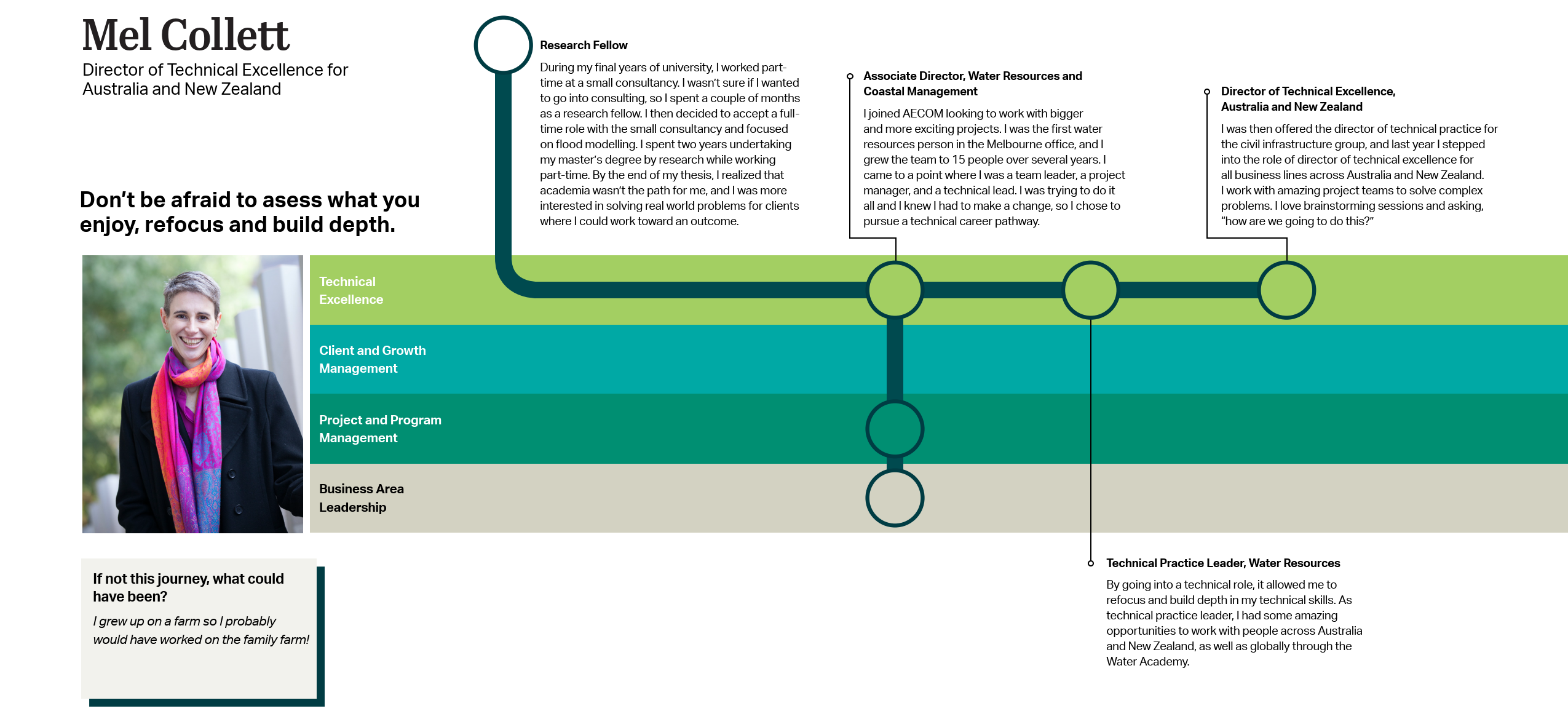Career Path Spotlight: Mel Collett
At AECOM, employees are encouraged and supported to pursue career paths that best fit their unique capabilities, interests, and aspirations. Our Career Path Spotlight series takes you through the rewarding career journeys of our employees who have stepped out of their comfort zone and taken on new challenges to chart their own successful careers and growth.
This time, we caught up with Mel Collett, Director of Technical Excellence for Australia and New Zealand, to discover how she chose the path she’s on today.
Hi Mel. What do you do for AECOM?
I’ve been at AECOM for 15 years and my current role is the Director of Technical Excellence for Australia and New Zealand. When my son was in kindergarten, he used to say I was a “teller builder.” I tell people where to build things and what to build.
Tell us about your career journey and how you got here.
I graduated with a Bachelor of Environmental Engineering from the University of Melbourne. During my final years of study, I worked part-time at a small consultancy. After university, I still wasn’t sure if I wanted to go into consulting, so I spent a couple of months as a research fellow to explore whether I wanted to do more postgraduate work. I decided to accept a full-time role with the small consultancy and focused on flood modelling.
After a few years, I was offered a scholarship by the University of Melbourne to return for postgraduate work and spent two years undertaking my master’s degree by research while working part-time. By the end of my thesis, I realized that academia wasn’t the path for me, and I was more interested in solving problems for clients – real world problems where I could work toward an outcome.
I joined AECOM looking to work with bigger, more exciting projects so I could see where my work fit into the bigger picture. When I joined, I was the first water resources person in the Melbourne office, and I grew the team to 15 people over several years.
I came to a point where I was a team leader, a project manager, and a technical lead. I was trying to do it all, and I knew I had to make a change, and in a career-defining moment, I chose to pursue a technical career pathway, which led me to my current role as Director of Technical Excellence for Australia and New Zealand.
Wow. Can you tell us more about that career-defining moment?
When I was on parental leave with my youngest child, I realized that I couldn’t keep doing it all and I wanted to spend more time with my family. I had to decide which career path was best for me. Being a project manager and people manager was reactive – I needed to be available and respond when something came up. That made it difficult to work part-time and plan around my family. By going into a technical role, I had more control over when I worked, and could get a better balance between work and family.
From that point, I was offered a role as Technical Practice Leader for Water Resources and had some amazing opportunities to work with people in Australia and New Zealand, as well as globally through the Water Academy.
I was then offered the Director of Technical Practices for the Civil Infrastructure group, which is our transport and water group, and last year I stepped into the role of Director of Technical Excellence for all business lines across Australia and New Zealand. I now choose how I spend my day and I get to prioritize what I work on. I still work on projects and love helping our clients solve problems.
What’s something you wish someone had told you years ago?
I was always scared to ask for help. I didn’t know what I wanted to do, and I didn’t want to tell people in case I failed. I think something a lot of engineers have a problem with is saying what they want, and not wanting to say it in case they don’t succeed. I wish someone had told me that I shouldn’t be afraid to talk to people about what I want to do. Once you start telling people what you want out of your career, they can help you succeed.
What advice do you have for people who want to chart their careers?
My advice is to think about what makes you happy and the day-to-day tasks that you enjoy at work because that is what you are most likely to be successful in. Although, you also need to align what you enjoy with the business strategy and drivers. So, put your business lens on and look at what parts of your role make you the happiest and see if you can form a career pathway in that direction.
If not this path, what would have been your career plan B?
I grew up on a farm so I probably would have worked on the family farm!







